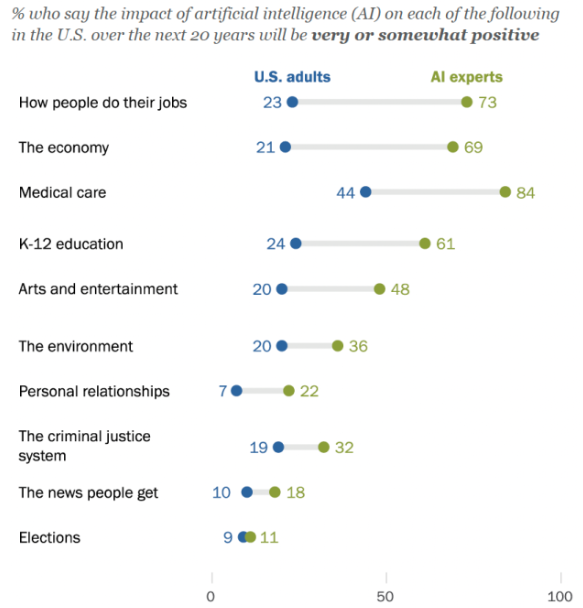Whether the criteria is “blogs devoted to the topic” or “tools built specially for publishers,” I’d like to consider myself high on both lists of AI-passionate and AI-empowering people out there.
And while that enthusiasm puts me in good company with the AI experts recently analyzed in Pew Research Center’s latest survey, it also puts me a ways away from the general public that the survey was rightfully using as its foundation.
Experts’ AI Enthusiasm
According to the survey, 57% of AI experts — defined by Pew Research Center as “individuals whose work or research relates to AI” — believe AI will have a very or somewhat positive impact on the United States over the next 20 years, contrasted by just 17% of the general public it surveyed.
“While 47% of experts surveyed say they are more excited than concerned about the increased use of AI in daily life, that share drops to 11% among the public,” the report’s authors write. “These surveys reveal both deep divides and common ground on AI. AI experts are far more positive than the public about AI’s potential, including on jobs. Yet both groups want more personal control of AI and worry about lax government oversight.”
On jobs, 39% of AI experts think AI will lead to fewer jobs, as opposed to 64% of the public. One area where the two parties are closer in agreement, however, is the job-reducing impact it will have on some specific jobs, namely (and unfortunately) journalists.
AI’s Impact On Journalists
“Some jobs — like cashiers — are widely viewed as at risk,” the authors write. “About three-quarters of U.S. adults and AI experts alike say that over the next 20 years, AI will lead to fewer jobs of this kind in the U.S. About half or more also say this for journalists, software engineers and factory workers.”
Speaking as both a former publisher who worked for decades alongside journalists and as the president of a software company that strives to help and empower all publishing teams, it’s almost laughable (yet frightening) to suggest or think that anything could possibly replace the work that journalists do.
That’s not to dismiss the concerns that experts and the public alike obviously have. It’s just at odds with what I understand journalism is and what I know AI can be.
I truly believe AI at its best can be a tool for complementing already excellent work, not a solution — and certainly not a journalist-alternative — unto itself.
Addressing AI Uncertainty
The takeaway by The Neuron’s Grant Harvey was more about AI uncertainty within the survey results, saying “between one-third and half of Americans answered ‘not sure’ to many questions, indicating a knowledge gap the industry must address.”
If there’s one other gap in the expert vs. public divide that I’d want to help bridge, it’s the 50% discrepancy regarding whether AI will have a positive impact on how people do their jobs.

(Source: Pew Research Center)
Only 23% of the public think it will have a very or somewhat positive impact, a number that I believe will only grow the more AI tools are explored for niche professional purposes.
AI is a wonderfully short name for an awfully large swath of capabilities (not to mention its ability to cover a massively broad spectrum of survey considerations and blog topics). The distinct nuances and sharp details become much clearer the more one looks at it through their own lens.
The more experts can help in illuminating those distinct features, the more obvious AI’s positive impact will be to the rest of the public.
SEE FOR YOURSELF
The Magazine Manager is a web-based CRM solution designed to help digital and print publishers manage sales, production, and marketing in a centralized platform.





